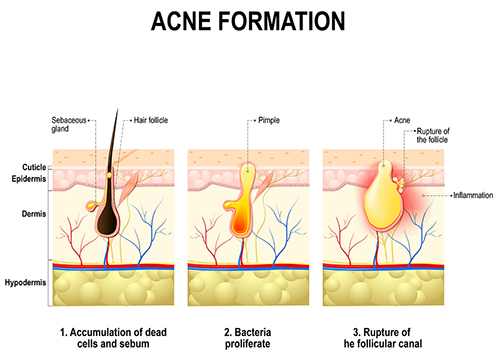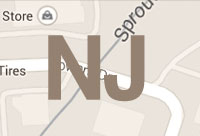Diagnosis and treatment of acne and acne scars in Paramus, Bergen County, NJ, and the Tri-State Area
Acne is a common skin condition that is often just a nuisance, but in some teenagers and adults, severe cases of acne can cause scarring and negatively affect a person’s self-image. Acne is one of the most common conditions treated by board-certified dermatologists.
Dr. Rebecca Baxt, Board-Certified Dermatologist and Medical Director, BAXT CosMedical® in Paramus, NJ, diagnoses and treats acne patients with a customized plan to help restore the skin to a healthy state and she will recommend a skin care regiment to minimize frequent breakouts. She also can help patients with acne scars.
The following acne and acne scarring treatments are available at BAXT CosMedical®:
Dr. Baxt, a board-certified dermatologist, will recommend the most effective treatment plans for optimal results.
What Is Acne?
 Medically speaking, acne (acne vulgaris) is a condition that affects the skin’s oil glands at the base of hair follicles. During puberty, these glands produce more sebum—an oily substance—which can clog the follicles. This buildup creates an environment where bacteria thrives, leading to breakouts such as pimples, whiteheads, blackheads, and, in some severe cases, nodules or cysts.
Medically speaking, acne (acne vulgaris) is a condition that affects the skin’s oil glands at the base of hair follicles. During puberty, these glands produce more sebum—an oily substance—which can clog the follicles. This buildup creates an environment where bacteria thrives, leading to breakouts such as pimples, whiteheads, blackheads, and, in some severe cases, nodules or cysts.
Types Of Acne & What You Need To Know
Dr. Baxt evaluates her patients to determine which type of acne is present, because this is the first step toward finding the best treatment. There are various types of acne, including:
- Comedonal Acne: Characterized by clogged pores, including blackheads and whiteheads, often seen on the forehead, nose, and chin.
- Inflammatory Acne: Involves red, swollen pimples and pustules caused by bacterial buildup—more common in men due to increased sebum production.
- Cystic Acne: A severe form of acne where deep infections cause large, painful red bumps under the skin, often leading to acne scarring.
- Hormonal-Onset Acne: Typically occurs in women when estrogen levels fluctuate, especially around menstruation, pregnancy, or menopause.
- Back Acne (Bacne): Acne that appears on the back and shoulders due to sweat, friction, and overactive oil glands.
See More BAXT CosMedical Acne Patient Results
Acne is more severe in males in their teenage years, but often females have a tougher time in their 20s and 30s. Dr. Rebecca Baxt, a board-certified dermatologist, treats many adult men and women who are struggling with adult-onset acne. For women, this condition is referred to as hormonal-onset acne, which is due to estrogen decline. Acne can appear not only on the face, but also on the body.
Since each patient’s skin is different, careful consideration and care is advisable when recommending a treatment protocol for acne and acne scars. Dr. Baxt advises her patients that when over-the-counter acne treatments no longer work, it is time to see a board-certified dermatologist!
What Are Some Of The Common Causes Of Acne?
Acne occurs when the follicle of an oil gland clogs. Acne can occur on the face, chest, and back. However, there are some things that can make acne worse, or breakouts occur more frequently. These include:
- Fluctuating hormone levels due to menstruation, pregnancy, or menopause
- Pollution
- Picking or squeezing pimples (DON’T DO THIS!)
- Over-scrubbing (irritating) the skin
- Stress
ACNE FACTOID! Dr. Baxt tells her patients, contrary to popular belief, foods are not the major cause of acne, although in select patients there can be a food sensitivity. Common food culprits include sugar, alcohol, dairy, chocolate, oily foods, and high glycemic index foods.
Because every skin type is unique, an individual evaluation by a board-certified dermatologist is essential to identify the root causes of acne, thereby preventing future breakouts and promoting long-term skin health.
What are Some Treatment Options for Acne?
Dr. Rebecca Baxt has extensive experience in treating acne and, after your consultation, will discuss the medical treatments available and effective prescription medications that can help with your acne. Some of the more common medications that may be prescribed include antibiotics, Isotretinoin, and Accutane. For women, birth control pills or Spironolactone (Aldactone®) may be recommended.
If you cannot tolerate or do not want medical treatments, which can have side effects, Dr. Rebecca Baxt will recommend appropriate treatment options, safe for all skin colors, including:
- Isolaz® Acne Treatment: A treatment that uses Intense Pulsed Light (IPL) and suction to kill bacteria and unclog pores, helping you put your acne into remission.
- Chemical peels: There are various peels that are effective treatment options for acne. However, Dr. Baxt cautions you to NOT purchase or use an over-the-counter DIY peel. They can cause severe chemical burns and more when not performed by a dermatologist or other licensed and trained medical practitioner.
- Photodynamic Therapy (PDT): Is an effective treatment of acne when used with a photosensitizing agent, such as Levulan®. The light source activates the Levulan® resulting in the killing of the patient’s acne bacteria*. PDT also helps reduce the acne patients’ oil glands.
- Smoothbeam Laser: Is a diode laser that is absorbed by the water in the under-surface of the skin. It improves acne by affecting the oil-producing sebaceous glands and helps reduce acne scars by stimulating the production of new collagen*
What Causes Acne Scarring?
Some types of acne are more likely to cause scarring than other types. For example, a simple whitehead or blackheads do not cause scarring. For patients with inflammatory or cystic acne, there can be noticeable scarring. Some acne patients may be prone to acne scarring due to:
- Family history or genetics
- Lack of early treatment
- Picking or causing trauma to the skin
Acne scarring can affect a person’s self-esteem and quality of life. With advanced treatments, acne scarring can be corrected.
What Are the Best Treatment Options for Acne Scars?
There’s no one-size-fits-all solution for treating acne scars. That’s because the ideal treatment depends on several factors—including your scar type, skin type (tone), and the severity of scarring. Fortunately, Dr. Baxt can help! She will provide a personalized treatment plan tailored to your skin’s unique needs. Available options may include:
- Dermal (Facial) Fillers: advanced FDA-approved fillers can help smooth the appearance of indented acne scars by plumping the skin from within.
- Laser Resurfacing: A popular and effective treatment for reducing acne scarring, laser resurfacing improves skin texture and stimulates collagen production.
- Light and Energy-Based Therapies: Treatments such as intense pulsed light (IPL) target acne at deeper levels, minimizing their appearance without damaging the outer layer of skin.
- Chemical peels: A customized chemical solution exfoliates scarred skin and encourages new skin regeneration, helping to reduce the appearance of deeper scars.
Expert Advice From Dr. Rebecca Baxt
Learn more about acne and acne scars:
- Are You Tired from Suffering with Cystic Acne?
- Are You Suffering with Maskne?
- Acne Awareness & Acne Treatments
- Acne is More Than A Skin Condition
- Dr. Baxt interviewed in PopSugar Beauty “High Frequency Treatments for Acne- Do They Work and Are They Really Effective?”
- Dr. Baxt interviewed for Parade.com “What Is Hormonal Acne?”

